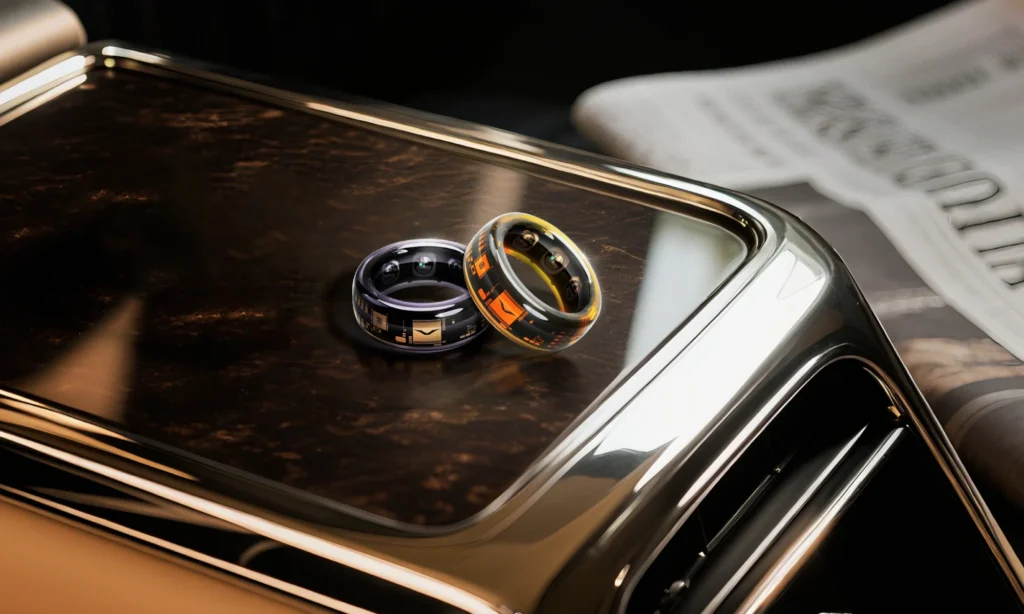In today's rapidly evolving digital landscape, the conversation around smart ring features has become indispensable for any health-conscious individual. Whether you are just beginning your wellness journey or are a seasoned bio-hacker, understanding the nuances of what these discreet wearables can do will provide you with invaluable insights and actionable strategies for a healthier life. This comprehensive guide will explore all aspects of smart ring features, offering you practical knowledge to achieve your health and fitness goals.
Why Smart Rings Matter in 2025: A Market on the Rise
The smart ring market is experiencing explosive growth, driven by a growing consumer focus on health and wellness, alongside advancements in sensor technology. Projections indicate a significant market expansion, with some reports suggesting the market could reach $1.9 billion by 2032. This surge in popularity is a testament to the demand for convenient, non-intrusive health monitoring. Unlike bulkier smartwatches, smart rings offer a comfortable and stylish way to track your well-being 24/7.
The future of smart rings looks even more promising, with potential advancements in medical-grade monitoring, such as non-invasive glucose level tracking, and deeper integration with AI to provide personalized health recommendations. As technology continues to evolve, smart rings are poised to become an even more integral part of personal health management.
Top 7 Smart Ring Features Revolutionizing Health Tracking
Modern smart rings are packed with sophisticated sensors that provide a holistic view of your health. Tiny sensors on the inside of the ring track key biometric data through your finger. Here are seven of the most impactful features:
-
Advanced Sleep Tracking: Smart rings excel at monitoring your sleep, providing detailed breakdowns of your sleep stages (light, deep, REM) and tracking metrics like heart rate, heart rate variability (HRV), and body temperature. This data is often synthesized into a daily “readiness” or “sleep score” to help you understand your body's recovery.
-
Heart Rate and HRV Monitoring: Continuous heart rate tracking offers insights into your cardiovascular health. Heart Rate Variability (HRV) is a key indicator of your body's stress and recovery levels, helping you to know when to push yourself and when to rest.
-
Activity and Calorie Tracking: Smart rings monitor your daily movement, including steps taken and calories burned. Many can automatically detect different types of activities, providing a comprehensive overview of your fitness.
-
Body Temperature Sensing: By tracking subtle changes in your skin temperature, smart rings can provide early indications of illness or, for women, help with menstrual cycle prediction.
-
Blood Oxygen (SpO2) Monitoring: This feature measures the oxygen saturation in your blood, which can be a valuable indicator of respiratory health, especially during sleep.
-
Stress Monitoring: By analyzing your HRV and other metrics, some smart rings can provide insights into your stress levels throughout the day, helping you to identify and manage stressors.
-
Women's Health Tracking: Many smart rings now offer dedicated features for women's health, using temperature and other data to track menstrual cycles and provide fertility insights.
How to Choose the Right Smart Ring for You
With a growing number of options on the market, selecting the right smart ring can seem daunting. Here are some key factors to consider:
-
Features: Determine which health metrics are most important to you. If in-depth sleep analysis is your priority, look for a ring that excels in that area. For fitness enthusiasts, robust activity tracking will be a key feature.
-
Subscription Fees: Be aware that some of the leading smart rings require a monthly subscription to access all of their features and data analysis. Other models offer a subscription-free experience.
-
Comfort and Design: Since you'll be wearing it 24/7, the ring's comfort and aesthetics are crucial. Look for a lightweight design and a style that suits your personal taste.
-
Battery Life: Smart rings generally offer a longer battery life than smartwatches, but it can still vary between models. Consider how often you're willing to charge your device.
-
App and Ecosystem: The companion app is where you'll interact with your data. A user-friendly and insightful app can significantly enhance the experience. Also, consider compatibility with your smartphone (some rings are optimized for specific operating systems).
Top Smart Ring Options in 2025
Here's a look at some of the leading smart rings and what they have to offer:
-
Oura Ring Gen 4: Often considered the benchmark in the smart ring market, the Oura Ring offers comprehensive and accurate health tracking, particularly for sleep. It provides detailed insights and a user-friendly app, but it does require a monthly subscription to unlock all features.
-
Ultrahuman Ring AIR: A strong contender, the Ultrahuman Ring AIR provides in-depth health metrics without a subscription fee. It's known for being lightweight and comfortable, making it ideal for 24/7 wear.
-
RingConn Smart Ring Gen 2 Air: This is a great budget-friendly option that doesn't skimp on essential features. It offers solid sleep and activity tracking without a subscription and boasts an impressive battery life.
-
Samsung Galaxy Ring: A newer entrant to the market, the Samsung Galaxy Ring is a compelling option for Android users, especially those already in the Samsung Health ecosystem. It offers robust sleep and activity tracking with no subscription fee.
Smart Ring Comparison
| Feature | Oura Ring Gen 4 | Ultrahuman Ring AIR | RingConn Gen 2 Air | Samsung Galaxy Ring |
| Key Features | Advanced sleep & readiness tracking, women's health, 24/7 heart rate | Subscription-free, lightweight, stress & recovery tracking | Budget-friendly, long battery life, sleep apnea detection (beta) | Seamless Samsung Health integration, AI-backed sleep insights |
| Subscription | Yes ($5.99/month) | No | No | No |
| Battery Life | Up to 7 days | Up to 6 days | Up to 10 days | Up to 9 days |
| Compatibility | iOS & Android | iOS & Android | iOS & Android | Android only |
| Price | Starts at $349 | $349 | $199 | Starts at $299.99 |
Who Are Smart Rings For?
Smart rings are an excellent choice for a wide range of individuals:
-
Health-Conscious Individuals: Anyone looking to gain a deeper understanding of their overall health and well-being will benefit from the detailed insights a smart ring provides.
-
Those Focused on Sleep Improvement: The advanced sleep-tracking capabilities make smart rings a powerful tool for anyone wanting to improve their sleep quality.
-
Fitness Enthusiasts: Athletes and active individuals can use the data on recovery and activity to optimize their training.
-
Tech-Savvy Users Who Prefer Discretion: For those who want the benefits of a wearable without the bulk and distractions of a smartwatch, a smart ring is the perfect solution.
-
Individuals with Specific Health Concerns: Features like SpO2 monitoring and temperature sensing can be valuable for people keeping an eye on particular health metrics.
Frequently Asked Questions (FAQ)
1. How accurate are smart rings?
Smart rings use advanced sensors that can provide highly accurate readings for metrics like heart rate and body temperature. While they are not medical devices, they offer valuable insights into your health trends.
2. Can I wear a smart ring while swimming or showering?
Most smart rings are water-resistant, allowing you to wear them while showering, washing your hands, and even swimming. However, it's always best to check the specific water resistance rating of the model you choose.
3. Do smart rings have screens or notifications?
Generally, smart rings do not have screens or provide notifications. Their purpose is to discreetly collect data in the background, which you can then view in the companion app on your smartphone.









